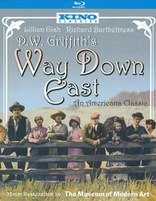Way Down East Blu-ray Movie
HomeWay Down East Blu-ray Movie 
Kino Lorber | 1920 | 149 min | Not rated | Nov 22, 2011Price
List price:Amazon: $17.49 (Save 50%)
Third party: $17.49 (Save 50%)
Only 7 left in stock (more on the way).
Movie rating
6.9 | / 10 |
Blu-ray rating
| Users | 0.0 | |
| Reviewer | 4.0 | |
| Overall | 4.0 |
Overview
Way Down East (1920)
The callous rich, portrayed by Lennox, think only of their own pleasure. Anna is but a poor country girl whom Lennox tricks into a fake wedding. She believes that it is true, but secret, while he has his way with her. When she is pregnant, he leaves her and she must have the baby, named Trust Lennox, on her own. When the baby dies she wanders until she gets a job with Squire Bartlett. David falls for her, but she rejects him due to her past and then Lennox shows up lusting for Kate. Seeing Anna, he tries to get her to leave, but she doesn't, and she tells no one about his past. When Squire Bartlett learns of her past from Martha, the town gossip, he tosses Anna out in a snow storm.
Starring: Lillian Gish, Richard Barthelmess, Lowell Sherman, Burr McIntosh, Kate BruceDirector: D.W. Griffith
| Drama | 100% |
Specifications
Video
Video codec: MPEG-4 AVC
Video resolution: 1080i
Aspect ratio: 1.34:1
Original aspect ratio: 1.33:1
Audio
Music: DTS-HD Master Audio 5.1
Music: LPCM 2.0
Subtitles
None
Discs
50GB Blu-ray Disc
Single disc (1 BD)
Playback
Region free
Review
Rating summary
| Movie | 4.0 | |
| Video | 4.5 | |
| Audio | 4.0 | |
| Extras | 2.0 | |
| Overall | 4.0 |
Way Down East Blu-ray Movie Review
Moralistic melodrama from the king of the genre.
Reviewed by Casey Broadwater December 2, 2011Kino-Lorber must’ve realized that Blu-ray buyers would need a cinematic palate cleanser after watching D.W. Griffith’s epic Birth of a Nation—a
three-hour masterpiece spoiled by the bitter taste of racism—so they’ve concurrently released 1920’s Way Down East, one of the director’s
lighter films and his greatest commercial success. Of course, when I say lighter, I mean lighter compared to Birth of a Nation and it’s
successor, 1916’s almost apologetic Intolerance—Griffith’s way of saying, “Look guys, I’m not really racist”—but Way Down
East still has its share of finger-pointing and stern-browed moralizing.
Tagged as “A Simple Story of Plain People,” the film opens with a lengthy series of expository intertitles about—basically—the urge men have to spread
their seed far and wide, the “high standard” of monogamy that the “man-animal” has not yet reached, and the anguish that “Today’s Woman”
endures due to her expectation to have “ONE CONSTANT MATE.” (Yes, the intertitles use all caps here.) A modern film would probably put it more
bluntly: Guys are man-whores who treat women like disposable sperm depositories. The opening title sequence closes with this solemn, hand-over-the-
heart statement of intent: “If there is anything in this story that brings home to men the suffering caused by our selfishness, perhaps it will not be in
vain.” Always didactic, that Griffith.
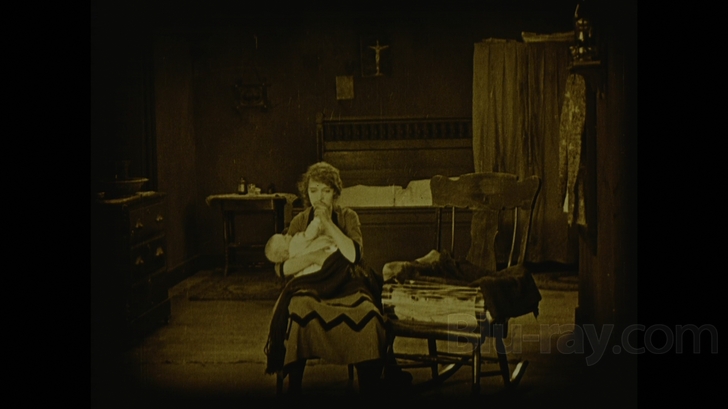
Based on Lottie Blair Parker’s 1898 play of the same name—which also spawned two earlier silent films and a later talkie—Way Down East details the man-troubles of the willowy Anna Moore (Lillian Gish), a wallflower who lives in rural New England with her penniless widowed mother. Traveling the “trail of the poor relation,” Anna leaves home and heads to the city, where she asks to be taken in by her wealthy aunt, who throws lavish bridge parties and has two social butterfly daughters who look down their aquiline noses at Anna’s country bumpkin fashion sense. Nonetheless, it’s Anna’s “delicate beauty” that catches the eye of the doughy Lennox Sanderson (Lowell Sherman), a rich playboy whose three specialties, we’re told, are “ladies, ladies, and LADIES.”
Infatuated and naïve, Anna falls hard for Lennox, who tricks her into a sham wedding as a way to worm his way under her petticoats, so to speak. For Anna, their supposed honeymoon is the “fulfillment of girlhood dreams,” but to the rakish Lennox, naturally, it’s “just another adventure.” Inevitably, Anna ends up preggers and abandoned, forced to go through childbirth—or, “Women’s Gethsemane”—alone in a dingy boardinghouse. She names the newborn Trust Lennox—ironically, the thing she shouldn’t have done in the first place—and it soon dies in her arms. (Saddest intertitle ever: “The little hands grow cold upon her breast.”) As if that isn’t depressing enough, she baptizes the already dead baby out of fear for its soul after the landlady sternly warns her that the poor kid will “never see God.” Good lord.
What’s fascinating about Way Down East is that Griffith rails against two opposing types of people. He gives immoral philanderers like Lennox a good thrashing, but he’s also strongly critical of those on the opposite end of the spectrum—the self-righteous, legalistic Bible-beaters who have little room for mercy in their rigid interpretation of the scriptures. Representing this puritan mindset is Squire Bartlett (Burr McIntosh), a well- to-do farmer who suspects Anna might have an unreputable past, but allows her to work as a housemaid at the insistence of his kindly wife, who takes Anna in and treats her like a daughter.
The Bartlett’s soft-eyed dreamer of a son, David (Richard Barthelmess), begins to pine for Anna, though he’s unwillingly betrothed to his first-cousin Kate (Mary Hay), a cheeky cutie who—in a conveniently plot-complicating twist—is the latest objet du désir of the womanizing Lennox. As you’d expect, Anna’s deep dark secret eventually comes to light—thanks to the town’s gossipy old maid—and this leads the Squire to evict her from the house in the middle of a blizzard, causing her to stumble at night out onto an icy river. In the film’s most famous sequence, Anna clings desperately to a dislodged floe while David hops from one ice chunk to the next, trying to rescue her before she goes over the lip of an enormous waterfall. It’s a spectacularly dangerous-looking scene, and a memorable climax for a film that otherwise might not make much of an impression on modern audiences.
Even when it was released—at the start of the roaring jazz age, when flappers and suffragettes first challenged gender roles and the country’s uptight Victorian sense of propriety began to loosen—Way Down East was stodgily behind-the-times, nostalgic for turn-of-the-century moral simplicity. True, you might make a case for it as a proto-feminist film of sorts, as it empathizes with a woman scorned, but it also posits that the only way a woman can be fulfilled is in the context of a traditional marriage to a good man. As much as it admonishes men to be unselfish and kind, this is exactly the heart of its now-outmoded stance—it makes men the sole guarantors and agents of women’s happiness. Anna isn’t redeemed by her own actions, she’s made “respectable” again when David marries her. You imagine Betty Friedan and the second-wave feminists of the 1960s collectively rolling their eyes.
So, quaint is one word that comes to mind when watching Way Down East from a vantage point way down the stream of social progress in 2011. Sentimental is another. But there are definite charms in its rural hayseed hokeyness, like the film’s nearly Dickensian cast of funny supplementary characters, including a whispering old spinster, the flask-sipping drunk who’s secretly loved her for decades, a cowlicked lepidopterist who flails about hilariously with his butterfly net, and a gummy-jawed old fart named Hi Holler who can’t seem to get his horse to trot. Standing in dramatic opposition to these one-note comic caricatures is the beautiful Lillian Gish, the “First Lady of the Silent Screen,” who gives one of her most dimensional and moving performances here. Watch Anna’s demure pride in the “fashionable” gloves her mother gives her as a parting gift—which turn out to be considered shabby in the city—and see the elation on her face when the crooked Lennox professes his love for her. And I dare you: try to hold back a pitying sigh when Anna’s eyes well up at the death of her baby. You can’t. It’s impossible. Way Back East may be old-fashioned, even amongst silent films, but if there’s one reason to watch it now—over ninety years since its release—it’s Gish.
Way Down East Blu-ray Movie, Video Quality 
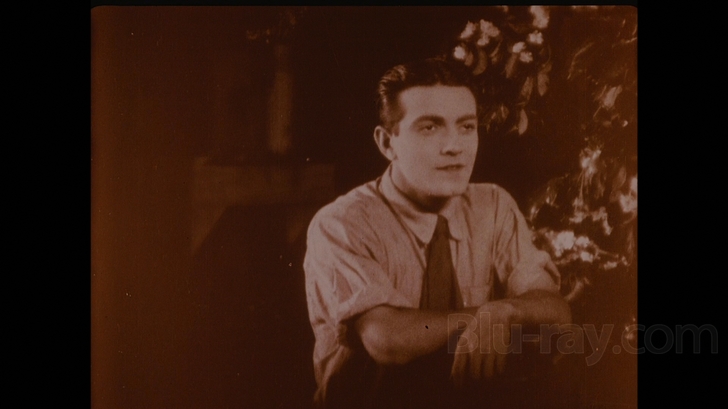
The Museum of Modern Art recently performed an extensive restoration of Way Down East, which Kino has presented on Blu-ray by way of a
wonderful 1080i/AVC-encoded transfer. Yes, the picture is interlaced, but I assume this was a necessary evil—a way to cope with the film's
original frame rate. Regardless, I didn't notice any motion artifacts or combing, so no harm, no foul. Along with the usual specks, scratches, and bits of
debris that you expect when watching silent films, certain scenes from Way Down East seem to have suffered some chemical degradation,
which has left the image slightly warped and periodically covered by what look like white abrasions. It's worth noting, but if you're already accustomed to
watching 90-plus-year-old films then it won't be a distraction at all. Frankly, it's amazing that any of these films have survived for so long, and we can be
grateful that companies like Kino and organizations like MOMA are committed to restoring and preserving them in a form as close as possible to their
original states. If you've seen previous home video editions of Way Down East—which is in the public domain and has suffered its share of
horrible transfers—you'll probably be amazed at the clarity of this new release. MOMA has also tinted the black and white image back to Griffith's
specifications, and the coloring looks natural and balanced. Film grain has been entirely preserved as well, and there are no signs of edge enhancement
or
other forms of digital boosting. For the few scenes of the film that have been completely lost to time, new intertitles provide a brief description of the
missing action.
Do note that as it's quite difficult to capture usable screenshots in 1080i, all shots in this review were captured in 720p and do not represent the full
visual quality of Kino's transfer.
Way Down East Blu-ray Movie, Audio Quality 
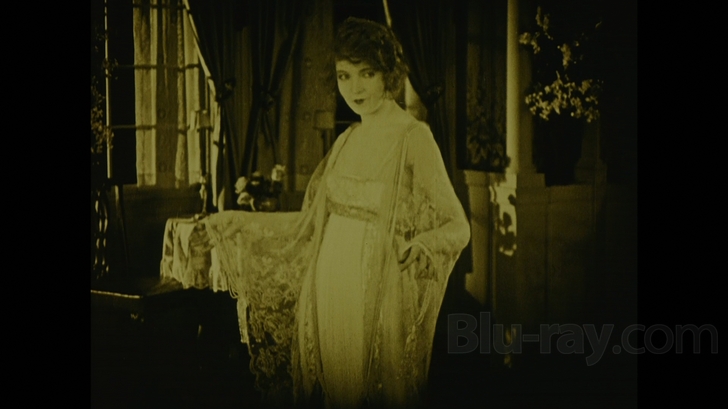
The Mont Alto Motion Picture Orchestra, Kino's go-to collaborators for original and reinterpreted silent movie music, has compiled a new score for Way Down East, pieced together from arrangements from other period films. The music works exactly as it should in context—complementing rather than overpowering the images on screen—and it sounds wonderful, with richly and dynamically defined instrumentation. The disc gives you two options for the audio—a DTS-HD Master Audio 5.1 mix or a LPCM 2.0 stereo track—and both choices are clean and stable, with no hissing, pops, crackles, or drop-outs. All intertitles are in English, and there are no subtitle options available.
Way Down East Blu-ray Movie, Special Features and Extras 
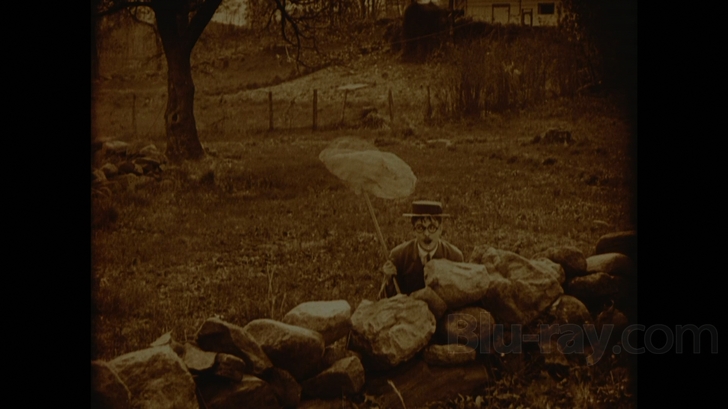
- Uncle Tom's Cabin Excerpt (1080i, 00:48): A short clip from the 1903 Edwin S. Porter film Uncle Tom's Cabin, which was the inspiration for the ice flow sequence.
- Notes on the Play (text only): Info on Lottie Blair Parker's theatrical production of Way Down East.
- About the Score (text only): A short essay about how the new score for Way Down East was compiled by the Mont Alto Motion Picture Orchestra.
- Image Gallery: Complete with scans of the film's original program.
Way Down East Blu-ray Movie, Overall Score and Recommendation 
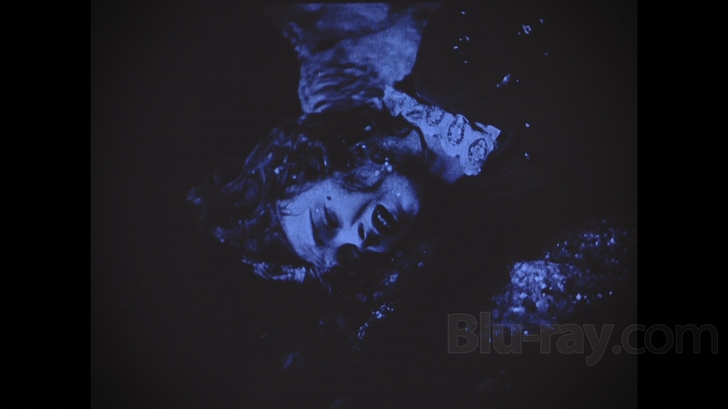
Way Down East is the kind of large-scale melodrama only D.W. Griffith could pull off—massively expensive and patently moralizing, but also tender and funny and genuinely observant. If the jagged racism of Birth of a Nation is stuck in your throat, this comparatively palatable morality tale might help you wash it down. As you've come to expect from Kino's treatment of silent classics on Blu-ray, the film looks wonderful here and is accompanied by a fitting new score by the Mont Alto Motion Picture Orchestra. Recommended!
Similar titles
Similar titles you might also like

Wonder Wheel
2017

The Paradise: Season Two
2013

Blonde Venus
1932

A Master Builder
2013

Heaven Knows What
2014

Great Expectations
1946

Mammoth
2009

Crimes and Misdemeanors
1989

Solitary Man
2009

Ned Rifle
2015

Still Alice
2014

This Happy Breed
1944

The Damned
La caduta degli dei
1969

Women Talking
2022

Serena
2014

Ace in the Hole
1951

The Age of Innocence
1993

Challengers
2024

Factory Girl
2006

Frances Ha
2012
